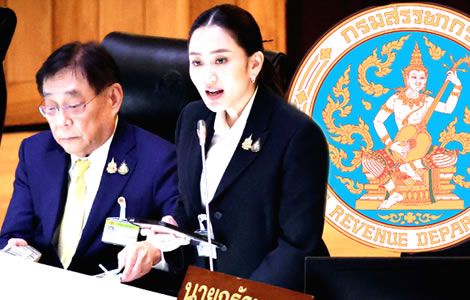End of Thailand’s ‘happy-go-lucky’ economy? Paetongtarn’s radical plan aims to end the grey market with sweeping tax reform, debt relief, and financial education. SMEs, foreignersm, workers and the self-employed face massive shifts in this bold new vision.
Prime Minister Paetongtarn Shinawatra gave her government’s policy statement to parliament on Thursday. In effect, it came just a year after her predecessor’s speech to the body. However, the plans outlined by Ms. Paetongtarn are decidedly more ambitious and groundbreaking than her predecessor’s. Certainly, at its core is a radical plan to eliminate Thailand’s massive grey economy. In short, the government intends that every worker in Thailand, as well as foreigners, will be brought into the tax net. The plan envisions a reverse tax system where low-paid workers will be incentivised to do so. This will be achieved by income supplements tied to specific income thresholds. At length, the plan corresponds with moves to bring foreign residents into the tax net as well.

On Thursday morning, Paetongtarn Shinawatra, the Prime Minister, gave the constitutionally required policy statement to parliament. The speech is required under Section 162 of the 2017 Constitution.
In effect, it is a guideline issued by the government regarding its forthcoming agenda. It also addresses the costs of all initiatives to ensure they are within the national plan and the government’s resources.
The requirement is a legacy of the 2017 charter, which critics say imposes a straitjacket on the government. Supporters of the provision suggest that it helps foster transparency in government and fiscal rectitude.
Prime Minister Paetongtarn’s 10-point policy statement includes debt relief and financial education plans
The plan outlined by Ms. Paetongtarn was certainly quite different from that presented by her predecessor, Srettha Thavisin, to parliament this time last year. In effect, it is an ambitious and dynamic plan which has all the fingerprints of her father, Thaksin Shinawatra. In particular, the plan echoes comments made by Mr. Thaksin at a business forum in Bangkok in August.
The policy statement was divided into 10 points. Afterwards, the policy statement will be defended by government ministers. At the same time, the opposition can comment and criticise.
However, no vote will be taken once the constitutional requirement is fulfilled. In turn, any attempt by the government to deviate from the policy outlined can theoretically be tested in the courts. Certainly, it must be shown that the government and cabinet has acted in bad faith.
The first policy introduced by Ms. Paetongtarn, or Ung Ing, is an ambitious plan to restructure Thailand’s chronic household debt mountain. Currently, the figure is estimated to be in excess of ฿16.3 trillion.
Research this week by the University of the Thai Chamber of Commerce (UTCC) showed that the average household debt was ฿606,378. Furthermore, the amount has increased by 8.4% since 2023. The figures also alarmingly show that 30% of this figure is informal debt, which is often at unfavourably high levels of interest. With 20.7 million households in Thailand, this comes to ฿12.552 trillion.
The Bank of Thailand has limited lending, while SMEs struggle with debt, leading to closures in many sectors
In the last year, the Bank of Thailand has overseen a reining in of consumer loans and credit for automobiles. However, the level of indebtedness has massively grown due to a lack of economic growth.
In parliament on Thursday, Ms. Paetongtarn promised that government-owned banks and financial institutions will spearhead an attempt to relieve the situation.
Furthermore, she emphasised the teaching of financial literacy and the development of traditional saving methods, particularly at local level.
The second item in the policy statement concerns the protection of Thailand’s embattled SME sector. The private sector crisis has seen banks all but cut off credit to this sector in recent years. Indeed, overall business lending in 2024 has become marginal as banks emphasise credit quality over volume.
At the same time, SMEs are suffering from a lack of investment, particularly since the pandemic. In short, they are becoming less competitive. Meanwhile, they are facing competition from Chinese concerns using scaled operations. Certainly, many firms are being forced to close. Even in the service sector, such as transport, the influx of Chinese competition this year has become a threat to many firms.
The government on Thursday also pledged to combat this threat from competitor countries such as China.
Government to negotiate debt relief and pursue public-private partnership to aid struggling SMEs
Ms. Paetongtarn’s government will liaise with financial institutions to negotiate debt relief for viable concerns. One policy proposal is a ‘matching fund,’ a joint investment between the private and public sectors.
In brief, the goal will be to save viable concerns that are struggling under heavy debt loads.
The third item on Ms. Paetongtarn’s agenda is maintaining what was one of the more successful policies of Mr. Srettha’s government. That is a concerted effort to subsidise or keep energy and utility bills lower.
In this respect, the policy calls for a review of laws and regulations. Crucially, this is in contrast to many Western nations which have quite purposefully let energy costs rise to combat climate change. The plan calls for a review of all private contracts relating to the purchase of energy. Thailand, in particular, has quite an advanced electricity production model with private firms working with the state producer, the Electricity Generating Authority of Thailand (EGAT).
Thailand to explore maritime natural gas resources plan with Cambodia despite political risks and opposition
The plan significantly identified the development of a natural gas field and energy source in disputed waters with Cambodia. Notably, this is presently the subject of a Maritime Memorandum of Understanding signed with Cambodia in 2001.
In particular, this agreement was recently the subject of a rejected Constitutional Court challenge made by Palang Pracharat Party deputy leader Paiboon Nititawan.
In short, this indicates that it is bound to be a flashpoint in the brewing war between Thaksin Shinawatra and the Pheu Thai Party on one side and conservative forces on the other. Certainly, the friendship between Cambodia’s strongman, Hun Sen, and Mr. Shinawatra will be raised by critics of the government.
Plan aims to bring all of the economy into the tax net. Reverse tax system encouraging formal employment
At length, the central point of this policy statement is a plan to bring 100% of Thailand’s economy into the tax net. In short, this signals the end of the grey economy thought to be some 50% of GDP.
Indeed, this is presently being legislated for with respect to foreigners and expats. However, with only 12.8 million out of a workforce of 48 million registered for tax and social security, this is potentially a vast undertaking.
Revenue Department preparing legislation as new Expat tax regime may link visas and tax returns
Paetongtarn’s heart signal already lands government in hot water. Unstable coalition appears doomed
Mr. Thaksin has floated an original plan developed by Thai officials for a reverse income tax scheme. In brief, it means that registered workers can receive top-ups on their income from the state.
At the same time, when their income exceeds a certain threshold, they begin to pay income tax. This scheme is provided for in outline in the policy statement. This plan is part of Thailand’s ambition to become a fully-fledged Organisation for Economic Co-operation and Development (OECD) member.
In turn, the government hopes that this will also spur international confidence and investment.
Digital Wallet ฿10,000 plan will launch. Wider strategy to build a digital economy and central database
The fifth part of the statement deals with the Digital Wallet ฿10,000 giveaway plan. Undoubtedly it was the bugbear of Mr. Srettha’s short-lived government. At this time, it is expected that cash will be disbursed.
This will be funded from already ring-fenced monies from the 2024 and 2025 budgets. The first tranche of ฿10,000 paymmemnts will be made this month to welfare card holders. Afterwards, a second tranche of ฿10,000 payments will follow in the New Year to other groups
On Thursday, the Prime Minister spoke of a central database to identify the needs of the public. Clearly, all this has been part of government policy for some time. In addition, so too is laying the groundwork for developing a digital economy.
The sixth policy proposal aims to strengthen farmers’ income. This will be achieved at length by making farming more market-driven. The policy aims to harness new technologies to improve farming efficiency.
This also extends to fisheries and the development of an industry based on livestock. The statement, in particular, mentions halal food as Thailand seeks to develop Middle Eastern markets. It used a Thaksin-era expression: making Thailand the “kitchen of the world” and helping with global food security.
Government continues tourism-friendly visa policies. Plans severe penalties for drug kingpins and dealers
In the meantime, the seventh policy proposal is to maximise foreign tourism. Here, a continuation of Mr. Srettha Thavisin’s policies is proposed. In short, making Thailand’s visa regime conducive to maximising foreign tourism expenditure.
This has seen a relaxation in Thailand’s visa policies. They have become more liberal, with up to 90 days available to 93 countries, in addition to the introduction of a DTV visa for digital nomads.
The policy statement talked about developing man-made tourist attractions through investment. In particular, entertainment complexes. In turn, these may be home to legalised casinos if the government legalises and licences the activity as planned.
Point eight deals with decisively addressing the country’s chronic drug problem.
New PM Srettha’s policy statement in parliament fails to inspire and is met with stinging criticism
The plan calls for closer cooperation with neighbouring countries in fighting illegal drugs. The government will target high-value drug lords, particularly those engaged in cross-border drug shipments.
At the same time, local and small-time drug dealers will also be dealt with severely. In short, this means jail time and seizing assets.
Meanwhile, drug users will be taken into care and offered training and rehabilitation. The Prime Minister said the aim would be to return quality people back into society.
New measures target transnational Cybercrime and increased support for vulnerable groups in Thailand
The ninth objective would be a more resourced crackdown on transnational cybercrime. In short, Thailand is being seen now as a base from which criminal gangs, mainly Chinese, can exploit scams, controlled from grey areas on its borders with Cambodia, Laos, and Myanmar.
Dismissed Chiang Mai cop’s network could make 10k calls a day. Top officers fear endemic corruption
Scammer’s plan to use SpaceX Starlink satellites in transnational scam network targeting Thailand with deception
US intelligence and security services have recently called on Thailand to help wipe out this menace. Not only are there scam centres targeting Thailand, but also the United States.
The tenth aspect of the plan calls for more security and increased support for the most vulnerable. In short, social welfare will be developed alongside economic opportunity. The goal is to allow everyone in society to lead a dignified life. The plan calls for particular attention to be paid to homeless people, marginalised ethnic groups, the elderly, and the disabled.
Tax reform plan aims to modernise Thailand’s economy but could end the era of small, independent traders
Undoubtedly, the central aspect of Ms. Paetongtarn’s plan is the end of Thailand’s grey economy. The new tax reform plan has long been recommended by financial analysts and those within the banking sector.
However, this will simultaneously bring an end to the “happy-go-lucky” era in Thailand of small enterprises and self-employed traders.
While this may be an essential step in transforming the kingdom into a more modern and productive economy, it will certainly spell the end of an era. Similar changes in Western economies in the second half of the last century sacrificed a more colourful street culture on the altar of economic progress.
Join the Thai News forum, follow Thai Examiner on Facebook here
Receive all our stories as they come out on Telegram here
Follow Thai Examiner here
Further reading:
Revenue Department preparing legislation as new Expat tax regime may link visas and tax returns
New tax era in Thailand begins as Revenue now shares data with 138 countries within the OECD
Calls for clarification of new Tax regime which appears to target expat foreign income sources
10 year visa a magnet for global citizens setting up in Thailand with zero tax on offshore income
Wealthy foreigners to own small landholdings associated with homes here agreed in principle
New plan for the Thai economy could see an elite foreign visa scheme generate up to 6% of GDP
Economic plan to put the smile back in Thailand’s appeal to western foreigners to live and work
IMF urges government to loosen nation’s purse strings as finances tighten with the tax take down
Plan to allow high tech and skilled foreigners to live and work in Thailand for up to four years


















